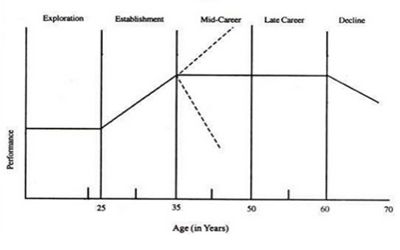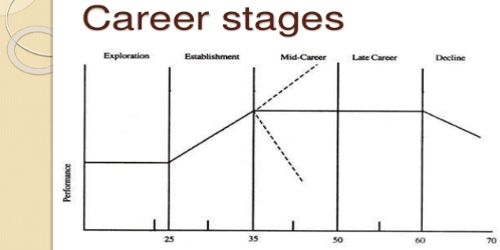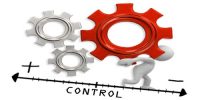The term career means a profession or stability over time. A career defined as the pattern or work-related and experiences that span the course of a personal life. It is the process of enhancing an employee’s future value. The proper way to analyze and discuss careers is to look at them as made up of stages. We can identify five career stages that most people will go through during their adult years, regardless of the type of work they do. These stages are exploration, establishment, mid-career, late career and decline.

Fig: Different Traditional Career Stage
Exploration: Many of the critical choices individuals make about their careers are made prior to entering the workforce on a paid basis. Very early in our lives, our parents and teachers begin to narrow our alternatives and lead us in certain directions.
The careers of our parents, their aspirations for their children and their financial sources are crucial factors in determining our perception of what careers are open to us. The exploration period ends for most of us in our mid-twenties as we make the transition from college to work. From an organizational standpoint, this stage has little relevance since it occurs prior to employment.
However, this period is not irrelevant because it is a time when a number of expectations about one’s career are developed, many of which are unrealistic. Such expectations may lie dormant for years and then pop up later to frustrate both the employee and the employer.
Establishment: The establishment period begins with the search for work and includes our First job, being accepted by our peers, learning the job and gaining the first tangible evidence of success or failure in the real world. It is a time which begins with uncertainties, anxieties, and risks.
It is also marked by making mistakes and learning from these mistakes and the gradual assumption of increased responsibilities, however, the individual in this stage has yet to reach his peak productivity and rarely gets the job that carries great power or high status.
Mid-career: Most people do not face their first severe dilemmas until they reach their mid-career stage. This is a time when individuals may continue their prior improvements in performance or begin to deteriorate. At this point in a career, one is expected to have moved beyond apprenticeship to worker-status.
Those who make a successful transition assume greater responsibilities and get rewards. For others, it may be a time for reassessment, job changes, adjustment of priorities, or the pursuit of alternative lifestyles.
Late career: For those who continue to grow through the mid-career stage, the late-career usually is a pleasant time when one is allowed the luxury to relax a bit. It is the time when one can enjoy the respect given to him by younger employees. During the late career, Individuals are no longer learning, they teach others on the basis of the knowledge they have gained.
To those who have stagnated during the previous stage, the late-career brings the reality that they cannot change the world as they had once thought. It is a time when individuals have decreased work mobility and may be locked into their current job. One starts looking forward to retirement and the opportunities for doing something different.
Decline: The final stage in one’s career is difficult for everyone but it is hardest for those who have had continued successes in the earlier stages. After several decades of continuous achievements and high levels of performance, the time has come for retirement.
Managers should be more concerned with the match for new employees and those just beginning their employment careers. Successful placement at this stage should provide significant advantages to both the organization and the individual.















